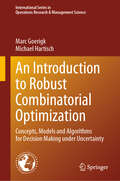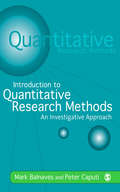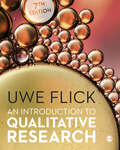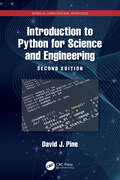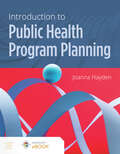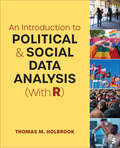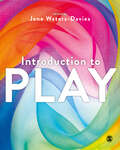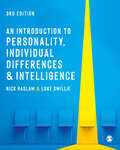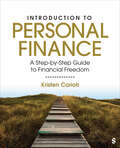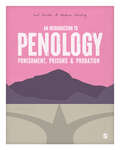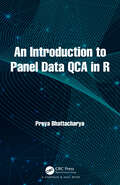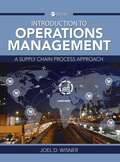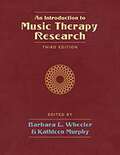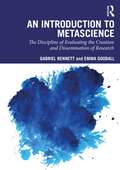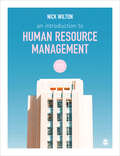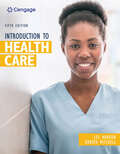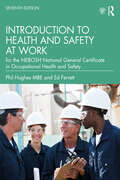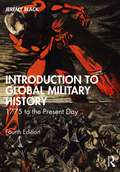- Table View
- List View
An Introduction to Robust Combinatorial Optimization: Concepts, Models and Algorithms for Decision Making under Uncertainty (International Series in Operations Research & Management Science #361)
by Michael Hartisch Marc GoerigkThis book offers a self-contained introduction to the world of robust combinatorial optimization. It explores decision-making using the min-max and min-max regret criteria, while also delving into the two-stage and recoverable robust optimization paradigms. It begins by introducing readers to general results for interval, discrete, and budgeted uncertainty sets, and subsequently provides a comprehensive examination of specific combinatorial problems, including the selection, shortest path, spanning tree, assignment, knapsack, and traveling salesperson problems. The book equips both students and newcomers to the field with a grasp of the fundamental questions and ongoing advancements in robust optimization. Based on the authors’ years of teaching and refining numerous courses, it not only offers essential tools but also highlights the open questions that define this subject area.
Introduction to Quantitative Research Methods: An Investigative Approach
by Peter Caputi Mark BalnavesIntroduction to Quantitative Research Methods is a student-friendly introduction to quantitative research methods and basic statistics. It uses a detective theme throughout the text to show how quantitative methods have been used to solve real-life problems. The book focuses on principles and techniques that are appropriate to introductory level courses in media, psychology and sociology. Examples and illustrations are drawn from historical and contemporary research in the social sciences. The original CD-ROM accompanying the book and its content are no longer available.
An Introduction to Qualitative Research
by Uwe FlickContinuing to be THE guide to the whole qualitative research process for students, this book looks at both the theory behind qualitative research and how to put it into practice in your own work. For students across a range of social science disciplines and beyond, this is a must to help you enhance your research project. This edition introduces: a decolonisation of methodologies a range of indigenous, queer and feminist perspectives on methodologies assistance with defending a viva and alternative forms of assessment to suit a changing world. More additions to this seventh edition include a section on the subjectivity of a researcher, and how your identity will shape your research. The further reading has been curated to include more than just western voices, providing you with global perspectives on qualitative research. This text introduces how to sensitively undertake ethical and inclusive research with marginalised groups. This book will help you master a comprehensive understanding of qualitative research.
An Introduction to Qualitative Research
by Uwe FlickContinuing to be THE guide to the whole qualitative research process for students, this book looks at both the theory behind qualitative research and how to put it into practice in your own work. For students across a range of social science disciplines and beyond, this is a must to help you enhance your research project. This edition introduces: a decolonisation of methodologies a range of indigenous, queer and feminist perspectives on methodologies assistance with defending a viva and alternative forms of assessment to suit a changing world. More additions to this seventh edition include a section on the subjectivity of a researcher, and how your identity will shape your research. The further reading has been curated to include more than just western voices, providing you with global perspectives on qualitative research. This text introduces how to sensitively undertake ethical and inclusive research with marginalised groups. This book will help you master a comprehensive understanding of qualitative research.
Introduction to Python for Science and Engineering (ISSN)
by David J. PineIntroduction to Python for Science and Engineering offers a quick and incisive introduction to the Python programming language for use in any science or engineering discipline. The approach is pedagogical and “bottom up,” which means starting with examples and extracting more general principles from that experience. No prior programming experience is assumed.Readers will learn the basics of Python syntax, data structures, input and output, conditionals and loops, user-defined functions, plotting, animation, and visualization. They will also learn how to use Python for numerical analysis, including curve fitting, random numbers, linear algebra, solutions to nonlinear equations, numerical integration, solutions to differential equations, and fast Fourier transforms.Readers learn how to interact and program with Python using JupyterLab and Spyder, two simple and widely used integrated development environments.All the major Python libraries for science and engineering are covered, including NumPy, SciPy, Matplotlib, and Pandas. Other packages are also introduced, including Numba, which can render Python numerical calculations as fast as compiled computer languages such as C but without their complex overhead.
Introduction to Public Health Program Planning
by Joanna HaydenWritten to provide students with the essential program planning skills that they'll need in public health practice, Introduction to Public Health Program Planning offers an accessible and engaging approach to the program planning process. Divided into 3 parts, Introduction to Public Health Program Planning begins with an introduction to the basics of planning, health determinants, and behaviors. It then offers in-depth discussion of the generic planning phases - from assessing needs and planning to implementing and evaluation. The third section explores the four most commonly used planning frameworks, along with three additional planning frameworks that address specific health issues. A final chapter offers guidance on choosing a planning framework.
An Introduction to Political and Social Data Analysis (With R)
by Thomas M. HolbrookAn Introduction to Political and Social Data Analysis (With R) provides students with an accessible overview of practical data analysis while also providing a gentle introduction to R. By starting with statistics first and using just enough R code to generate results, this text helps students focus on learning how to do data analysis while slowly gaining confidence in using R as they progress through the material. This book is structured around learning by doing. Students can follow along in each chapter by reading about statistics and their applications in R, and then running the R code on their own as they work through contemporary political science and social science examples. Author Thomas M. Holbrook patiently explains each step in in the process, avoiding overly complicated jargon and commands. Exercises at the end of chapters feature both conceptual and calculation-based questions so students can check their understanding data analysis and practice using R. At the end of the semester, students can confidently add skills in data analysis with R to their resumes.
An Introduction to Political and Social Data Analysis (With R)
by Thomas M. HolbrookAn Introduction to Political and Social Data Analysis (With R) provides students with an accessible overview of practical data analysis while also providing a gentle introduction to R. By starting with statistics first and using just enough R code to generate results, this text helps students focus on learning how to do data analysis while slowly gaining confidence in using R as they progress through the material. This book is structured around learning by doing. Students can follow along in each chapter by reading about statistics and their applications in R, and then running the R code on their own as they work through contemporary political science and social science examples. Author Thomas M. Holbrook patiently explains each step in in the process, avoiding overly complicated jargon and commands. Exercises at the end of chapters feature both conceptual and calculation-based questions so students can check their understanding data analysis and practice using R. At the end of the semester, students can confidently add skills in data analysis with R to their resumes.
Introduction to Play
by Jane Waters-DaviesThe go-to textbook for everything you need to know about play! Covering ages 0-8, this book explores what play is, why it matters and where and how play happens. Taking you from start to finish on your course, it helps you: Think critically about play and play provision Understand what good practice looks like See how theory translates into real-world settings Explore the issues, debates, and challenges within play and early learning
Introduction to Play
by Jane Waters-DaviesThe go-to textbook for everything you need to know about play! Covering ages 0-8, this book explores what play is, why it matters and where and how play happens. Taking you from start to finish on your course, it helps you: Think critically about play and play provision Understand what good practice looks like See how theory translates into real-world settings Explore the issues, debates, and challenges within play and early learning
An Introduction to Personality, Individual Differences and Intelligence (SAGE Foundations of Psychology series)
by Nick Haslam Luke SmillieWhat does it mean to have a personality? Is emotional intelligence a kind of intelligence? Learn the answers to these questions, as well as everything you need to know about personality, intelligence, and individual differences in the third edition of this clear and accessible textbook. From natural selection to intelligence tests, and from personality disorders to the concept of IQ, the panoramic coverage of this field makes this textbook essential reading for any psychology student on a personality and individual differences course. New to this edition: · Increased coverage of intelligence · ‘Key Theorists’ feature · Discussion questions moved to end-of-chapter to enable in-text assessment Nick Haslam is Professor of Psychology at the University of Melbourne, Australia. Luke Smillie is an Associate Professor of Psychology at the University of Melbourne and director of the Personality Processes Lab.
An Introduction to Personality, Individual Differences and Intelligence (SAGE Foundations of Psychology series)
by Nick Haslam Luke SmillieWhat does it mean to have a personality? Is emotional intelligence a kind of intelligence? Learn the answers to these questions, as well as everything you need to know about personality, intelligence, and individual differences in the third edition of this clear and accessible textbook. From natural selection to intelligence tests, and from personality disorders to the concept of IQ, the panoramic coverage of this field makes this textbook essential reading for any psychology student on a personality and individual differences course. New to this edition: · Increased coverage of intelligence · ‘Key Theorists’ feature · Discussion questions moved to end-of-chapter to enable in-text assessment Nick Haslam is Professor of Psychology at the University of Melbourne, Australia. Luke Smillie is an Associate Professor of Psychology at the University of Melbourne and director of the Personality Processes Lab.
Introduction to Personal Finance: A Step-by-Step Guide to Financial Freedom (Corwin Mathematics Series)
by Kristen CariotiIntroduction to Personal Finance invites students to reflect on their values and behaviors with money and to set goals to reach financial freedom and financial wellness. Author Kristen Carioti provides clear, step-by-step guidance on the essential building blocks, from setting up an emergency fund, to navigating student loans and investing for retirement. Students are encouraged to evaluate their personal relationship with money and mindfully assess their behavior so they can set and reach achievable financial goals.
Introduction to Personal Finance: A Step-by-Step Guide to Financial Freedom (Corwin Mathematics Series)
by Kristen CariotiIntroduction to Personal Finance invites students to reflect on their values and behaviors with money and to set goals to reach financial freedom and financial wellness. Author Kristen Carioti provides clear, step-by-step guidance on the essential building blocks, from setting up an emergency fund, to navigating student loans and investing for retirement. Students are encouraged to evaluate their personal relationship with money and mindfully assess their behavior so they can set and reach achievable financial goals.
An Introduction to Penology: Punishment, Prisons and Probation
by Lawrence Burke Helena goslingAn Introduction to Penology is a concise, informative, scholarly guide that will speak to a variety of audiences interested in how the notion of punishment plays out in community and custodial settings with people who have broken the law. With a particular focus on prisons and probation, the book provides an opportunity for readers to critically engage with the concept of punishment (in theory and practice) and consider different ways in which we, as a society, can respond to lawbreaking. The text will allow students to pursue a more in-depth study of two of the main criminal justice institutions through the lens of their organisational structures, cultures, service delivery and responses to the needs of minority and vulnerable groups. Throughout the text, students will be encouraged to critically engage with longstanding penological debates taking into consideration the theory, policy and practice of punishment, and will explore ways in which we can rethink penology on an individual and social level and begin to make a case for social justice rather than criminal justice. This innovative and contemporary text is a must read for students studying criminology, criminal justice, penology and those interested in pursuing a career in either the prison or probation services. Lol Burke is Professor in Criminal Justice and Dr Helena Gosling is a Senior Lecturer in Criminal Justice at Liverpool John Moores University.
An Introduction to Penology: Punishment, Prisons and Probation
by Lawrence Burke Helena goslingAn Introduction to Penology is a concise, informative, scholarly guide that will speak to a variety of audiences interested in how the notion of punishment plays out in community and custodial settings with people who have broken the law. With a particular focus on prisons and probation, the book provides an opportunity for readers to critically engage with the concept of punishment (in theory and practice) and consider different ways in which we, as a society, can respond to lawbreaking. The text will allow students to pursue a more in-depth study of two of the main criminal justice institutions through the lens of their organisational structures, cultures, service delivery and responses to the needs of minority and vulnerable groups. Throughout the text, students will be encouraged to critically engage with longstanding penological debates taking into consideration the theory, policy and practice of punishment, and will explore ways in which we can rethink penology on an individual and social level and begin to make a case for social justice rather than criminal justice. This innovative and contemporary text is a must read for students studying criminology, criminal justice, penology and those interested in pursuing a career in either the prison or probation services. Lol Burke is Professor in Criminal Justice and Dr Helena Gosling is a Senior Lecturer in Criminal Justice at Liverpool John Moores University.
An Introduction to Panel Data QCA in R
by Preya BhattacharyaIn the last few years, Qualitative Comparative Analysis (QCA) has become one of the most important research approaches in social science. This has encouraged researchers to apply QCA, to analyze cross-sectional and panel data, leading to the development of a variety of cross-sectional and panel data QCA models.This book compares four different panel data QCA models: Cluster QCA, Multiple Sub-QCA, Remote-Proximate Panel, and Relevant Variation Panel. It starts by introducing QCA as a research approach, then discusses the assumptions, and steps in a QCA research process. It then applies these assumptions and steps to demonstrate each of the 4 afore-mentioned panel data QCA models. Each chapter also provides a step-by-step guide, that researchers can follow while building any of these 4 panel data QCA models. Finally, it compares the strengths and weaknesses of each of these models and suggests scenarios where researchers can apply them. This book is supplemented by materials like datasets and codes, available at the end of each chapter, and online on Harvard Dataverse. This book can be used as a textbook for introductory and advanced courses on panel data QCA.
Introduction To Operations Management: A Supply Chain Process Approach
by Joel D. WisnerIntroduction to Operations Management: A Supply Chain Process Approach details how firms buy, make, deliver, and return goods and services around the globe, providing students with a solid foundation of operations management concepts and techniques. The text offers a set of activities that guide the effectiveness of organizations and prepare operations managers and other employees to ensure their firms are competitive. The book is organized from a strategic to a tactical perspective, beginning with foundational concepts and ending with broader discussions of managing supply chains. Dedicated chapters address corporate strategy, services design, inventory management, aggregate planning, forecasting, lean systems, quality management, integrating processes along the supply chain, and more. Numerous real-world examples, cases, and engaging exercises allow students to place themselves in the shoes of working operations management professionals. The second edition features examples of real companies using analytical tools in decision-making situations, as well as extensive web-based content including flashcards, YouTube videos, and graded chapter quizzes. The textbook's coverage also includes emerging trends for most chapters, such as sustainability, customer relationships, and working in the global marketplace. Written for today's students and the exciting, ever-evolving marketplace, the second edition of Introduction to Operations Management is the text to bring operations management into the modern era.
An Introduction to Music Therapy Research
by Barbara L. WheelerAn introductory overview of how research has been conceived and implemented in music therapy over the last several decades. The book was designed for those who are beginning their studies in music therapy research, and it is especially well-suited for use as an accompaniment to classroom instruction. <P><P> Seventeen of the chapters were excerpted from Music Therapy Research (3rd Edition), a much larger volume of 68 chapters that gives considerable detail on numerous topics and sub-topics. In addition, three chapters (15, 16, 17) were specially written to provide a birds-eye view of some of the chapters that were not included, and in particular, those chapters in the larger book that examined the numerous methodological designs and approaches used in objectivist, interpretivist and other types of music therapy research.
An Introduction to Metascience: The Discipline of Evaluating the Creation and Dissemination of Research
by Emma Goodall Gabriel BennettAn Introduction to Metascience delves into core metascientific concepts, offering a critical examination of current knowledge creation processes and scrutinising researchers and their methodologies across disciplines.This book stands alone as a comprehensive guide to metascience, offering readers a singular resource for understanding and implementing metascientific principles into their research practices. Readers will find this book invaluable for perfecting their research skills and enhancing the quality of their academic work. It exposes the reader to the intricacies of research processes, prompting a reevaluation of preconceived notions and fostering a deeper understanding of the flaws and solutions inherent in knowledge creation. Furthermore, it offers thought-provoking insights into implementing strategies to enhance research productivity, and it elucidates both the benefits and pitfalls of incorporating artificial intelligence in research production.Designed for scientists and researchers seeking to gain insight into the scientific process, An Introduction to Metascience caters to those interested in understanding how research evolves over time. It appeals to individuals eager to explore methods, practices, and philosophies of science to refine their approach to knowledge creation.
An Introduction to Human Resource Management
by Nick WiltonReflecting the global nature of the workplace, this is a concise introduction to the world of human resource management that goes beyond a prescriptive, how-to approach and prepares you for the issues and dilemmas you may face in your HR career. Includes new discussions on the impact of Black Lives Matter on HR, the effect of Covid-19 on recruitment and on the mental health of employees, and post-Brexit points-based immigration Boxed features including ‘Ethical Insights’, ‘Research Insights’, and ‘HRM in Practice’ highlight contemporary practices, critical perspectives, and discussions and debates related to each chapter Now features a running case study, where in each chapter you can apply what you’ve learnt to solve a challenge faced by the HR Manager of a hotel Illustrated with real-world case studies and examples from a cross section of industries, such as Netflix, Nike, and Just Eat Comprehensive online resources, including author videos, over 25 additional case studies, access to full journal articles and self-test quizzes. Suitable for anyone studying HRM – as part of an undergraduate or postgraduate degree, or on a specialist program of study.
An Introduction to Human Resource Management
by Nick WiltonReflecting the global nature of the workplace, this is a concise introduction to the world of human resource management that goes beyond a prescriptive, how-to approach and prepares you for the issues and dilemmas you may face in your HR career. Includes new discussions on the impact of Black Lives Matter on HR, the effect of Covid-19 on recruitment and on the mental health of employees, and post-Brexit points-based immigration Boxed features including ‘Ethical Insights’, ‘Research Insights’, and ‘HRM in Practice’ highlight contemporary practices, critical perspectives, and discussions and debates related to each chapter Now features a running case study, where in each chapter you can apply what you’ve learnt to solve a challenge faced by the HR Manager of a hotel Illustrated with real-world case studies and examples from a cross section of industries, such as Netflix, Nike, and Just Eat Comprehensive online resources, including author videos, over 25 additional case studies, access to full journal articles and self-test quizzes. Suitable for anyone studying HRM – as part of an undergraduate or postgraduate degree, or on a specialist program of study.
Introduction to Health Care
by Lee Haroun Dakota MitchellReflecting current practices and the latest research, Haroun/Mitchell's INTRODUCTION TO HEALTH CARE, Fifth Edition, provides a student-friendly introduction to the foundational skills necessary for a range of health care professions. This trusted text offers a comprehensive yet highly accessible survey of both soft skills and basic clinical skills for those entering health care training programs or considering a career in health care. It emphasizes core competencies required by all health care professions, including communication, infection control and professionalism. With a strong focus on developing critical thinking skills, the text uses a five-step problem-solving model to teach students to "think like" health care professionals. Completely up to date, the Fifth Edition includes expanded coverage of the opioid crisis, precision/personalized medicine, suicide prevention, health disparities and much more. Also available: MindTap digital learning solution.
Introduction to Health and Safety at Work: for the NEBOSH National General Certificate in Occupational Health and Safety
by Ed Ferrett Phil Hughes MBEIntroduction to Health and Safety at Work covers the fundamentals of occupational safety and closely follows the NEBOSH National General Certificate syllabus which was updated in 2019 and came into use in 2020.Highly illustrated and over 600 pages in length, it covers all of the essential elements of health and safety management, the legal framework, risk assessment and control standards and also includes checklists, report forms and record sheets to supplement learning. It also has an extensive summary of current health and safety legislation. Aligned to the NEBOSH National General Certificate in Occupational Health and Safety Practice questions and answers to test knowledge and increase understanding In addition to helping students study for the NGC, it is used for reference and revision on other Health and Safety qualifications at level 3 and above, including the Nebosh Diploma. It is also a source of reference and guidance for health and safety practitioners in the workplace.
Introduction to Global Military History: 1775 to the Present Day
by Jeremy BlackNow in its fourth edition, Introduction to Global Military History is an accessible, up-to-date account of modern warfare from the eighteenth century to the present.The book engages with the social, cultural, political and economic contexts of war, examining the causes and consequences of conflict beyond national and chronological boundaries. It challenges the dominant Western-centric, technologically focused view of military history and instead emphasises the ranges of circumstances faced by both Western and non-Western powers and the absence of any one direction of development. The chapters present integrated discussions of land, naval and air conflicts, addressing continuities and the ways in which common experiences affected different spheres. This edition revises the text throughout, has increased focus on the developments of the 2000s and 2010s, and adds a new chapter on the 2020s.Supported by a variety of illustrations, maps and case studies, this study is a valuable resource for students of military history and general readers alike.
